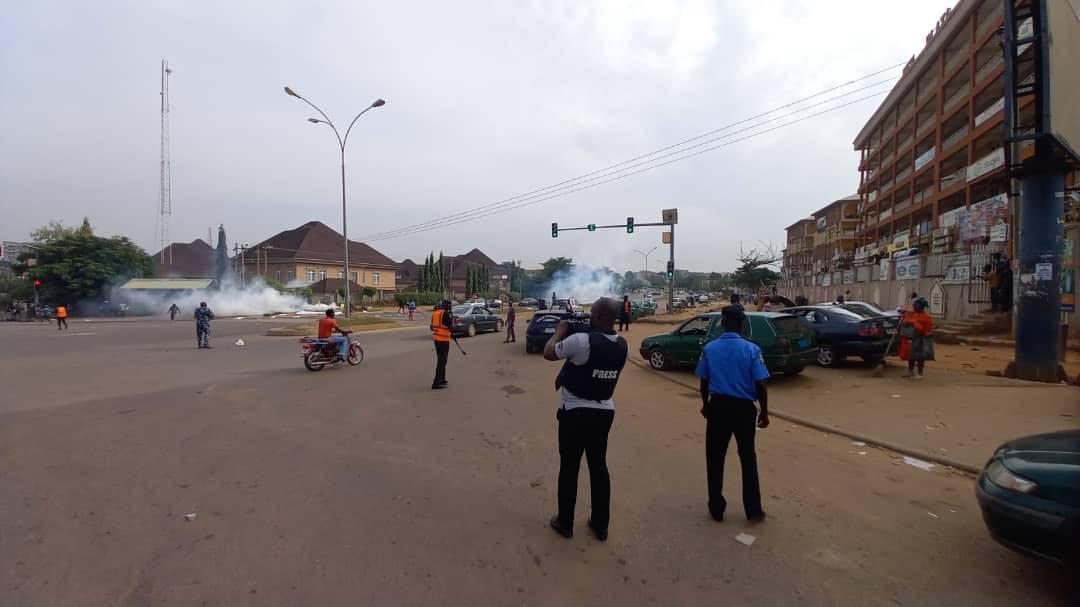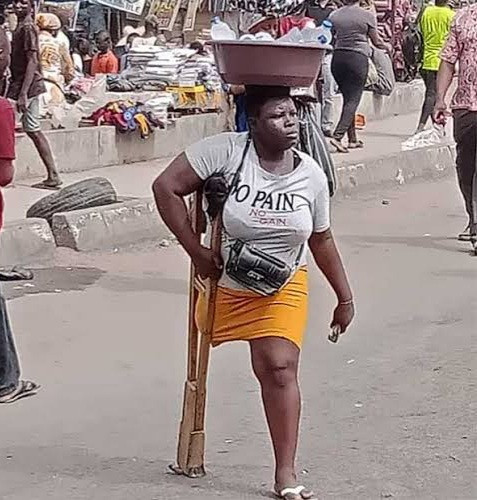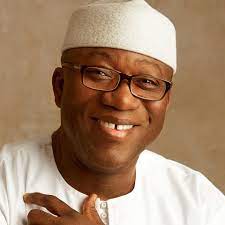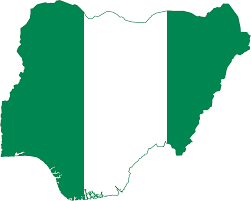Olatunji Ololade, investigative journalist and Associate Editor of The Nation newspaper, has reported conflict, environment, and crime within Nigeria and across international boundaries winning 31 awards for journalism excellence.
The Vent Republic Reporters caught up with him recently and a conversation was struck with him.
Below is the excerpt:
TVR: Did your growing up have any influence on your journalism career?
Olatunji Ololade: Yes, it did. My parents introduced me to literature very early in life via the Macmillan series and J.F Odunjo’s Alawiye. By age seven, I had read Chinua Achebe’s ‘Things fall Apart’ and D.O Fagunwa’s ‘Ogboju ode ninu igbo Irunmale’ twice respectively. I had an avid love of literature and read a lot of novels, newspapers and magazines. At age seven, I also wrote a column for a Lagos-based news magazine.
TVR: You attended the Moshood Abiola Polytechnic for your Ordinary and Higher National Diploma. What is your view on the discrimination suffered by polytechnic graduates in Nigeria especially in the Civil Service?
Olatunji Ololade: I believe the discrimination is baseless. Right now, there is a bill meant to correct the situation. Let’s hope the whole thing works out as expected. I do not see any reason why the unfair discrimination persists. If there are lapses in polytechnic education, we should correct them. Remember, we also have serious lapses in university education. Heck! Our education system is plagued by serious maladies. It’s about time we removed the pecking order imposed on our tertiary schools. A colleague once told me that polytechnics were created to provide middle and lower level manpower while universities were created to provide senior managerial staff, directors and so on. Imagine the shallow reasoning and entitlement mentality. Even if that were codified, it represents serious malfunction in vision and intent of the country’s education managers.
As the federal government seeks to remove the unfair dichotomy, I urge the presidency and national assembly to work together at revamping polytechnic education; massive funding is required to provide and improve facilities in the sector. Certain polytechnics should be merged and upgraded to universities of technology. Then, the bar must be raised on the quality of academic staff (lecturers and managers) employed by the schools. We mustn’t forget that our colleges of education require similar attention. We must create a world in which a student may aspire to get admitted into a university, polytechnic or college of education without inhibitions. None of these tertiary schools should be looked down upon or demoted (via inadequate funding, poor staff recruitment etc). Advocates of the pecking order would, however, reel out self-serving reasons all bordering on perceived inadequacies of polytechnics and polytechnic graduates but I insist that most of the arguments are fallacious. Right now, universities make a profit running conversion programmes for polytechnic graduates wishing to ‘upgrade’ their HNDs to degrees. Their position is self-serving, really. I could go on and on about this. It’s really exhausting. National development and progressive endeavour are driven by fully-formed men of character and brilliance, not First Class degree holders; Nigeria has suffered its fair share of looters, destroyers and national dream killers, who rode to public office on the wings of their perceived brilliance, and especially because they graduated summa cum laude. Of course, we have such characters among individuals with lower qualifications but it gets demoralising to see perceived bastions of superior thought, scholarship and professionalism propagate a culture of sleaze, inefficiency and destruction. I hereby stress that I have nothing against First Class graduates; it is always inspiring to see them emerge through the wilderness of the country’s education sector even as the system is rigged against their subsequent ethical blooming likewise those with lower qualifications.
sWhat we should seek to build is a generation of fully formed men and women of unimpeachable character, catholicity of culture, humaneness and a will to improve the fortunes of the country. To achieve this, we must strip the process of producing such patriots of the toxic baggage of discrimination, institutional and individual profiling, and the noxious culture of scholarship and administration that has plagued the country’s education system for too long.
TVR: Journalism is the most flexible profession in the world with the lowest barrier to entry; do you agree with a school of thought that journalists must have formal journalism training at the tertiary level?
Olatunji Ololade: Neither LASUTH nor LUTH would employ you as a neurosurgeon simply because you have a flair for cutting. You must have gone through a great deal of practical training, scholarship and vetting of your competency before you are deemed worthy of employment. In the same vein, we must raise the bar for journalism practice. Yes, I believe journalists must receive special formal training at the tertiary level. Having a flair for writing should never be enough to become a journalist especially when it is increasingly difficult to regulate entry into the field of journalism. There are too many charlatans masquerading as journalists with intent to blackmail their way to affluence and renown. The situation is aggravated by traditional media’s poor culture of engagement, terrible salaries and the influx of shady characters into the profession via online platforms. Socially responsible gate-keeping is relegated in a cutthroat atmosphere to ‘break the news first’ and get more internet page views.
We must always understand, for instance, that the #EndSARS protest escalated quickly via fake news being peddled by a lot of shady online platforms and so-called citizen journalists. Even some newspaper flagships goofed publishing outright falsehood in respect of the protest. These are consequences of the inadequacies in staff and organisational resources.
TVR: Are excellent journalists born or made?
Olatunji Ololade: Excellent journalists are self-groomed and made. They are products of a humane civilisation, scholarship and training, persistent introspection, high personal and professional ethics, and a commitment to excellence in pursuit of the collective good.
TVR: You have reported war and emergency crisis situations across Nigeria, Cameroon, Liberia and Cote d’ Ivoire. Can you share your experiences with us in each of the countries?
Olatunji Ololade: I am wary of sharing my experiences lest it amounts to a cheap brag. I can only say my experiences have been humbling. So far, they have granted me glimpses into the crisis of humankind. Human interest reporting is never an easy genre, you learn prudence, emotive economy and a devotion to factual presentation and analysis of accounts and events while paying good mind to the precepts of humaneness. I have learnt to see my respondents and other actors in every narrative as human elements deserving of honour, respect whatever the circumstances.
TVR: The internet and new media has greatly disrupted the print media with readers no longer purchasing hard copies of newspapers. Do you foresee the final requiem of the print media in the nearest future?
Olatunji Ololade: And how much does the public pay for media content online? We must quit nurturing this outrageous fallacy of an almighty online media to justify the newspaper deathwatch.
Newspapers won’t die anytime soon. Radio was supposed to end print hundreds of years ago. Television was supposed to end both radio and print. Then came the fancy gadgets and immersive technologies, mobile journalism, data journalism, 360 degrees tech, the drone, blablabla…All these are simply part of a cycle of innovations meant to enrich journalism, not set the traditional, pioneer media at war with knew media.
What’s this morbid fascination with the projected death of newspapers anyway? Why the fanatical focus on hastening newspapers’ death? Printed books would be next, I guess. Every industry contracts; petroleum, agriculture, stock market, and even silicon valley. Lest we forget the banks. Bankers aren’t the astute fund managers and administrators that they are mistaken for. About 52 Nigerian banks managed by Ivy League educated management have been bankrupted by incompetent, corrupt managers. But nobody has said banking mustn’t be left to bankers. Rather than observe a banking industry death watch, government and regulatory agencies hustle to save banks. Why not extend similar measures to newspapers? Perhaps because nobody wants a truly solvent, viable and highly professional media.
The best way to save jobs is to achieve a synergy of media and platforms around a viable business model. The ongoing media and platforms war is mischievously contrived and more beneficial to certain stakeholder segments. Think. A smart publisher like the New York Times has managed to turn the odds in its favour. Newspapers won’t die fast. They shouldn’t. The total demise and extinction of newspapers may never happen, irrespective of the depth and sheen of so-called dispassionate outcomes of supposedly objective media research. In 2013, the Center for Digital Future predicted that most printed newspapers had five years of life left. Their survival turns out to be more delayed than projected. In fact, as the print medium becomes more imperiled by declining economies, the pressure would mount from unexpected quarters to save it, I am certain.
Remember, at the advent of online journalism, there was a vigorous campaign by so-called netizens and large segments of the academia, for the media to phase out long form journalism. Many journalists and newspapers hopped on the bandwagon as it justified their aversion for anything long form.
Eventually, the advocates of “short, breezy and punchy” stories realised that the style was inadequate to produce impactful journalism; consequently, another movement emerged advocating long form journalism. Backed and heavily funded by non-profits and philanthropists, the ‘save long form journalism’ campaign started and reverberated around the world. Today, we have lots of non-profits like the Bill and Melinda Gates Foundation, the MacArthur Foundation, among others, funding investigations and long form journalism.
Even so, online journalism thrives in a bubble. Without funding from international NGOs, many online platforms will close shop in Nigeria. More than half of online users get their news from Facebook and other social media platforms, refusing to pay for news and using ad-blocking which hurts publishers’ revenue, according to a recent study by the Reuters Institute for the Study of Journalism (RISJ).
Most global and local digital news media are equally plagued by lack of a viable business model. But isn’t that the same affliction of the traditional press? And of human industry in general?
Serious bad news about a number of digital news outlets including BuzzFeed, HuffPost, Mashable, and Vice that have been forced to downsize staffs and operations, is a symptom of the digital content bubble where most online news providers continue to operate at great losses.
The Nigerian reality is that, smaller online publishers often start out with personal savings, handouts from politicians and corporate organisations, and funding from NGOs yet many die off without breaking even.
Even internationally oriented digital-born publishers remain in investment and growth mode, and have not been consistently profitable. Eventually, investors and owners lose patience and push for cost cutting as a way of turning a profit.
Major lesson: Venture capitalists and other backers are hardly smitten with vanity metrics, but with a return on their investment.
Yet we must accept that modern technologies have improved journalism practice. A well managed digital medium is more interactive and less uni-directional; although digital media audiences are still on the receiving end of a barrage oft uni-directional and devious news dissemination and information sharing process.
At the advent of new media, the traditional press has also learnt humility, which is a very good thing. Contrary to the doomsday predictors belting out oft biased, sponsored and slanted theories and study results from the comfort of their stuffy or draughty offices, new digital-born media have enriched mainstream journalism practice.
The New York Times, for instance, has turned challenges posed by new media into its strength. The medium’s third-quarter results for 2020 revealed that it currently has more than seven million subscriptions, of which more than six million are digital-only.
The advent of new media have made traditional publishers more innovative about content, and finicky about integrity of the process of news gathering, production and dissemination.
Smart traditional publishers understand that the internet and online platforms are here to enrich mainstream journalism, not kill it. But I understand the doomsday projection for all its worth; frantic prophesying driven by a fascination with the novelty of the new media and disillusionment triggered by the shortcomings of the traditional press which include god complex, undue publisher influence, poor welfare and mediocre management.
This isn’t to say that the online media are without similar shortcomings; they are equally plagued by undue publisher influence, poor welfare and mediocrity and god complex.
Some platforms operate by the maxim: ‘If we have to report it, then its the truth,’ which is quite horrendous, arrogant and reflective of an exaggerated sense of worth. Some of these platforms have been forced to hurriedly take down stories from their websites and beg victims of malicious and defamatory content published by them. Many of them lift stories from newspaper websites and simply remove the byline of the writer. That’s sour and very unprofessional.
Online journalism is highly unsustainable without funding and purity of intent. Good journalism is very expensive. This is why most online media are supported by NGOs. Such funding, however, comes with a leash; there is always an agenda to push and the fact remains that many online publishers feverishly commit to such agenda without recourse to journalism’s high ethics. There are a lot of stories built around lies. I have seen investigative reports built on the claims of just one party to a conflict; many reports are based on documents given to a particular journalist by a ‘whistle blower’ with questionable intent. When you receive such, you don’t just go to press immediately and give 20 paragraphs to a party (usually the one that gave you the super document) and two paragraphs to the other. As journalists, we must also never weaponise the little freedom we have claiming: “Every attempt to get in touch with him/her/the government proved abortive.” That’s often fraudulent and self-serving if we fail to exhaust possibilities at getting all views and achieving balance in reportage.
It’s also quite amusing to see journalists who built their career in mainstream print and broadcast media contort into anti-traditional press campaigners soon after they quit their jobs due to poor welfare or because they got sacked. I have seen online journalists relentlessly attack the mainstream media on several counts – many of which stem from their inability to break into the traditional newsroom or weather its rigours. Yes, the traditional press could do better. Yes, new media has been doing a lot of commendable work. But we must understand that journalism can only thrive when we attain a synergy of the old and the new.
I have been accused of clinging to the pre-social media era, when newspapers, radio and TV served as the primary channels of information. Perhaps its because strong virtues were formed during those years; there were certainties of creed, influence, profitability, and career progression that made journalism more well-defined than it is now.
Beyond nostalgia, I would say that new media projects good journalism – mostly long form even as several online platforms constitute Pandora boxes of fake news.
TVR: You have made a name in investigative journalism; why investigative journalism? Was it a choice or was it imposed on you?
Olatunji Ololade: It was a choice. Like I would always say, I am a product of nature and nurture in complex interaction. My childhood upbringing and pioneer years as an intern and subsequently, Reporter at Tell Magazine were instrumental to the journalist I have become. So far, my time at The Nation newspaper has been very ennobling and rewarding.
TVR: Investigative Journalism is very expensive but necessary to hold the government to account. How can the media better fund the work of investigative journalists in the face of declining advertising revenues and readership?
Olatunji Ololade: The media must devise more ingenious forms of audience engagement and subscription. We must trim unnecessary expenses and establish a multimedia smart newsroom. We must begin to build a journalism that thrives on unit sales and subscription and motley revenue generation initiatives. The best way to do this is to study more successful models abroad and see how we could emulate them with radical tweaks tailored to the quirks and exigencies of the Nigerian media clime.
TVR: Does the Nigerian Government really pay attention to the work of investigative journalists? Does their work have any impact on public policy?
Olatunji Ololade: Nigeria flaunts some of the best investigative journalists in the world. Even so, most investigative features published, at the end, resound as mere moral victory: that is, the capacity to publish against a slew of intra-organisational and external odds. It is saddening to note that we haven’t been able to influence major progressive policy change save very few interventions by the government and stakeholders involved in a highlighted social problem. Of course, most of our stories have aroused flashes of interest by the government in a highlighted problem. Yet all government does is to intervene to douse outrage or the noise generated by a story. What government does, most times, is akin to applying ordinary band-aid, and nothing else, on gangrenous sores.
TVR: You have won about 31 awards and counting; tell us your motivation for applying for these awards?
Olatunji Ololade: Ultimately, I thank Almighty Allah (SWT) for deeming my work worthy of recognition. Without His help, I would be nothing today; I would be nameless and worthless. Without His mercies, I would be so unremarkable pushing pen and filling space on journalism’s bleak expanse.
What motivates me is the good I could do by highlighting a certain social problem. While I do not seek praise or gratitude from beneficiaries of my intervention efforts, the occasional glint of hope that steal into their faces, their profuse gratitude at a fortunate turn in their affairs are enough inspiration for me.
It is also very difficult not to be inspired when you work with a title like The Nation; the medium continually inspires staff to commit to socially conscious, award winning investigative projects. It is noteworthy that I won all my 31 awards for investigations done and funded by The Nation.
TVR: Are awards really an accurate measure of the competence of a journalist? Isn’t there a level of subjectivity to it?
Olatunji Ololade: Whether we like it or not, awards are means of ascertaining a journalist’s competence. On award subjectivity, how is that a bad thing? It’s always a poor man’s consolation to claim awards aren’t the best forms of judging and rewarding competence. To some extent, this may be true. But I have seen journalists move from saying awards aren’t important to them to hugging the headlines and obsessing with stories about their wins or nominations. I understand it’s a human thing to retreat into toxic envy and contrived apathy when awards aren’t going their way but the moment the table turns in their favour, they enthuse the glory of their awards and nominations. Yeah, the process may not be perfect at all times; perfection is an elusive human experience. Still on subjectivity, isn’t life itself subjective? Everything about our existence thrives on subjectivity but this is not the forum for such discussion. In a nutshell, if you do good journalism, you will get rewarded for it, eventually. And that is not such a bad thing.
TVR: Has any of your awards influenced the decisions of the policy makers?
Olatunji Ololade: My first investigation as an intern with Tell Magazine, titled: ‘A family’s house of horror’ led to the rescue of three children kept in a hidden cell by their father and house-maid turned stepmother, in their home around Iju. They were rescued by a team of officers and Lagos State social workers after I discovered the cell hidden in their living room wall. That was in the year 2000. I never entered the story for an award due to my ignorance back then. I only started entering stories for awards in 2009.
Well, in response to my award winning stories, there had been flashes of interest and interventions by government and other stakeholders but like I said, they were often done to quell outrage, produce a fast, short-term solution or defuse an already tense situation. The investigative series on Lafarge WAPCO and its pollution of its host communities attracted urgent intervention from the Ogun State government. Then my investigative series on sex trafficking involving Nigerian girls kept as bonded slaves in Nigeria, Cote d’Ivoire, Oman and Lebanon contributed to the release of some of the girls. We must also note that journalism in Nigeria hardly influences policy change except the medium involved is a foreign-owned medium or there is a lot of noise-making online and chest beating online by the publisher.
TVR: Many media houses in Nigeria don’t fulfill their obligation to their employees by paying salaries regularly; do you support the total closure of such media houses?
Olatunji Ololade: I am sure there are rules of engagement and the punitive measures for violating them spelt out in local labour laws.
TVR: What legitimate opportunities can Nigerian journalists explore so as to be weaned off of the terrible yoke of the brown envelope syndrome?
Olatunji Ololade: It’s a question of values. Your deportment and deeds as a journalist reflect your innate values. No degree of incentivisation or access to opportunities could wean a journalist off the disgraceful yoke to bribe taking. I won’t recommend it to anyone. It’s disadvantages are legion and the benefits of abstinence are eternal.
TVR: How can a Nigerian journalist become a global practitioner in the 21st century which has been flattened by globalization and technology?
Olatunji Ololade: By understanding that whatever his or her platform, all journalism is local to varied audience. By getting equipped with the rudiments and the cardinal principles of journalism. By acquiring digital skills and understanding that gadgets and digital technologies are mere tools for achieving journalistic goals and enriching the practice.
Sadly, many journalists get smitten with devices at the expense of professionalism and journalism’s fundaments. The gadgets and new technologies have no essence without the skills, passion, purity of intent and professionalism of the handler (the journalist).
Great journalism thrives on good old, traditional and innovative fieldwork; you must hop in the trenches and engage in honest work. Good stories are never delivered to you a la carte, you must seek them out and work to actualise them.
We must aspire towards journalism that stimulates progressive debates about power structures, laws, privileges, industry, and justice; that is, journalism capable of signalling the end of an outdated culture designed to serve corrupt sentimentality and power structures.
So doing, journalism may regain trust and Nigeria can see the overall story that is being told, the problems that are being highlighted, and the practical solutions to identified issues – while balancing the costs of such practice against the reality of new media and a severely commercialised media industry.
We have more questions to contend with as journalists: How can long-form journalism operate a successful business model across platforms? Should the Nigerian newsroom be funded by non-profits? Many have expressed fears over the downsides of NGO-funded journalism yet we must acknowledge that beneficiaries, online media in particular, have fulfilled and are still fulfilling crucial roles continually jettisoned by the traditional press for base reasons. Then we must all understand that the media’s fate is bound across all platforms and that neither journalism nor Nigeria’s future could be narrowed to ‘digital.’ If it doesn’t ennoble the citizenry; if it doesn’t expose the corrupt, and divest society of its plagues, it is not journalism. The future isn’t digital. The future is humane. It is ethical.
TVR: In this current era of massive layoffs in the media, what advice will you give aspiring freelance investigative journalists desirous of setting up shop?
Olatunji Ololade: There is no magic formula to it. Good journalism will always thrive and attract recognition. Of course, attention must be paid to underlying issues of aesthetics, layout, reach and so on. Journalist entrepreneurs must avoid the pitfalls of the combative approach which is usually steeped in the lore that to quickly make a name in journalism, you must pick fights with the government and fight dirty using oft contrived and sensational headlines. In the name of investigative journalism, we have seen a lot of spurious name-calling and labelling by so-called investigative journalists. This is inordinately partisan, immature and unprofessional.
Many are always too eager to justify funding acquired from foreign backers or donors and they end up sexing up their headlines and stories with emotive shingles that are hardly professional. This is in very bad taste.
You don’t have to get into an ugly, dirty fight to assert your worth and competence as an investigative journalist. Just do good, honest work; highlight governance failure without compromise, expose individual, institutional and societal corruption impartially and without mischief and you will attain renown for your good work, in time.
Journalists must also be wary of the booby trap infested social media. Social media, once seen as a liberating tool from the arbitrariness of legacy press and traditional journalists, have become a channel for spreading fake news and malicious misinformation.
Certain events in 2020, like the #EndSARS protest and its dangerous radicalisation to spread fake news led to a nationwide carnage thus establishing how social media and digital technology can be exploited to foment crisis and imperil nationhood in a country like Nigeria. India, the Philippines, Myanmar and Brazil are also examples of how a handful of apps may be manipulated and perverted by a shady political elite and local civil societies (acting with sinister foreign collaborators) to spread misinformation and incite people to mayhem, when they are the major platforms by which most people access and share information. Journalists must ensure that published reports are socially responsible, objective, prudent, truthful and accurate.
TVR: The National Universities Commission made it mandatory for all Nigerian academics to have a doctorate degree before they can lecture. Is a Ph.d really necessary to teach journalism? Shouldn’t it be more experienced based as nothing beats field work?
Olatunji Ololade: We must understand that the rule governing academic scholarship requires that aspiring faculties possess certain qualifications and experience amenable to scholarly research. It’s the best way to maintain standard. Yet we should take a cue from more progressive societies in America, Asia, Europe, and even in some African countries where many reputable universities and journalism schools employ seasoned journalists as Associate Professors with opportunities for seamless integration into the academia. Over here, in Nigeria, one or two schools have adopted similar measures although they are very careful about titles and nomenclature. Journalists with actual industry experience will undoubtedly enrich both the teaching and learning process of journalism and media studies in our schools. Our universities must devise a way to accommodate experienced journalists not alienate them. The Pan Atlantic University is performing excellently in this respect thus its indisputably Ivy League scholarship.
TVR: How can the Nigerian Union of Journalists best protect journalists’ interests?
Olatunji Ololade: By actually fulfilling the duties professed in their mission statement.
TVR: A school of thought believes that journalists who greatly contribute to the growth of their platforms should have a share of the media house’s profits as a way of encouraging them to do more and giving them financial security. What is your view on this?
Olatunji Ololade: I believe its a prerogative of media establishments to adopt such measure or not. And its also a prerogative of the journalist to either leave or stay put with any medium that supports his or her growth.
TVR: Most Nigerian Journalists lack a pension plan because of the general instability of the profession. What advice will you give current journalists in service especially the young ones on how to be relevant when their employer’s pay check stops rolling in?
Olatunji Ololade: Every journalist must seek self development and diversified competencies to stay relevant in a fast changing world. Some join the academia, some write books and others venture into completely different occupations like farming, public relations, film making.
TVR: Most Nigerian media houses are owned by politicians and non journalists, the advent of the internet has greatly reduced the barrier to entry. How can journalists take advantage of this to be successfully entrepreneurial?
Olatunji Ololade: I have answered a similar question above. But I would say that we all know what real journalism is, right? Let’s not fool ourselves by ennobling the glittery dross projected as journalism on the internet. That would be an insult to real journalists doing good work across multimedia platforms.
TVR: Can Nigerian journalists successfully hold the government to account if they work in media houses owned by politicians who may be scared of losing government patronage?
Olatunji Ololade: The best way to resolve this problem is for the public to support media houses owned by journalists via patronage. Good journalism costs money and the very few journalists with a passion for it are hindered by lack of funds to power such enterprise. Few journalists are willing to bear the burden and risks of a sole proprietorship or partnership without surety of public patronage. More worrisome is the fact that the public gravitates more towards online publishers of celebrity gossip and dross – this is understandable given the slant and perversions of our cultural milieu.
If the public does not want journalists to work in media houses owned by politicians, folk should support media owned by journalists. But then, there is the issue of lack of competent media managers among journalists. More journalists should acquire managerial expertise knowing the theories and practicals would resonate throughout their career as mere noise, except they match knowledge acquired with sterling character and a humane disposition to enterprise leadership.
There are well documented instances whereby media houses owned by politicians hold government to account via sustained socially responsible reportage. It is also interesting to note that most of such stories are shorn of political agenda – the reportage are purely pro-citizenry and without the influence of some political celebrity or sponsor.
TVR: Should a journalist be a generalist – knowing a little of everything or a specialist – knowing a lot about a little?
Olatunji Ololade: He should be everything of both.
TVR: President Muhammadu Buhari’s administration was six recently. How has it fared so far? Did he keep his campaign promises?
Olatunji Ololade: Buhari’s administration is a reflection of Nigerians’ collective personae. We got we deserved. We will live with the reality of his government, good or bad, knowing he is the manifestation of our strife of contraries.
TVR: There have been virulent attempts at secession by agitators like Mazi Nnamdi Kanu and Sunday Adeyemo a.k.a Sunday Igboho. Are their demands legitimate? Are they rebels with a just cause?
Olatunji Ololade: I would say that we got to the sorry pass that produced such political characters through successive series of leadership and governance failure. It would take an ingenious, humble, brilliant, emotionally intelligent, proactive leadership and humane populace to constructively address and resolve our problems.
TVR: Boko Haram Insurgents have been emboldened and taking over many Nigerian territories. How can the Nigerian army put a permanent end to the insurgency?
Olatunji Ololade: By providing gainful employment for the youth and enabling their capacity to create employment for themselves – when government provides crucial infrastructure like good roads, electricity, access to SMEs grants, among others, they enhance viable self-employment generation drives. Government must also muster the will to quash terrorism, without politicising the fight or hindering it by a fraudulent disposition. Our current military possess the intelligence and might to end the insurgency as long as they keep dirty politicking and corruption out of their approach.
TVR: Bandits are gradually taking over our highways and country. The parents of the recently released fourteen students of Greenfield University said they paid a whopping 180 million naira. How can banditry be a thing of the past?
Olatunji Ololade: I would reiterate that government enhances self-employment generation drives by providing crucial infrastructure. Then a greater involvement of the police, SSS and local vigilance groups in anti-crime measures.
TVR: The prices of essential food items are skyrocketing; how can the government most effectively tame inflation?
Olatunji Ololade: By mustering the will to entrench good governance. It’s not that we do not know what measures to take, its the will to implement and sustain remedial measures that is our problem. It’s often exhausting having this discussion. Nigeria is experiencing multiplex challenges in relation to inflation, unemployment and insecurity. We can reduce inflation by entrenching policies that foster job creation, macro and micro-economic stability and more inclusive growth. Government could cut its bloated and obscenely “padded” (inflated) wage bills and expenditure; government could radically downsize and facilitate access to financing for small and medium enterprises in key sectors to mitigate the effects of inflation on businesses and households; but all these will remain esoteric and specialised mumbo-jumbo until we address Nigeria’s greatest plague, which is her affliction by a selfish, greedy, corrupt electorate and political class.
So, no matter how vociferously we advocate our need to expedite reforms on exchange rate management, trade and fiscal policy among other measures, the success of our interventions is very much dependent on the human elements overseeing the implementation.
TVR: What is your view on the restructuring of the country?
Olatunji Ololade: There is need to sit down and discuss it. It’s an inevitable recourse for Nigeria.
TVR: On a lighter note what are your thoughts on the popular Big Brother Nigeria show? Should it be banned for indecency? Did you ever have a favourite housemate on the show?
Olatunji Ololade: The Big Brother Nigeria show, like several other muckfests, adds no value to our civilisation yet it thrives apparently because millions of Nigerians are recognised and closet perverts. There will be greater, intense debauchery in the forthcoming edition. A lot is being done to desensitise the country to greater degeneracy and cultivate in our youths in particular, less inhibitions towards sexual and sexuality depravities. And producers of the BBN show will get away with anything because the Nigerian society as become too permissive.
TVR: Thank you very much for your time; we wish you resounding success in your future endeavours.
Olatunji Ololade: You are welcome.






